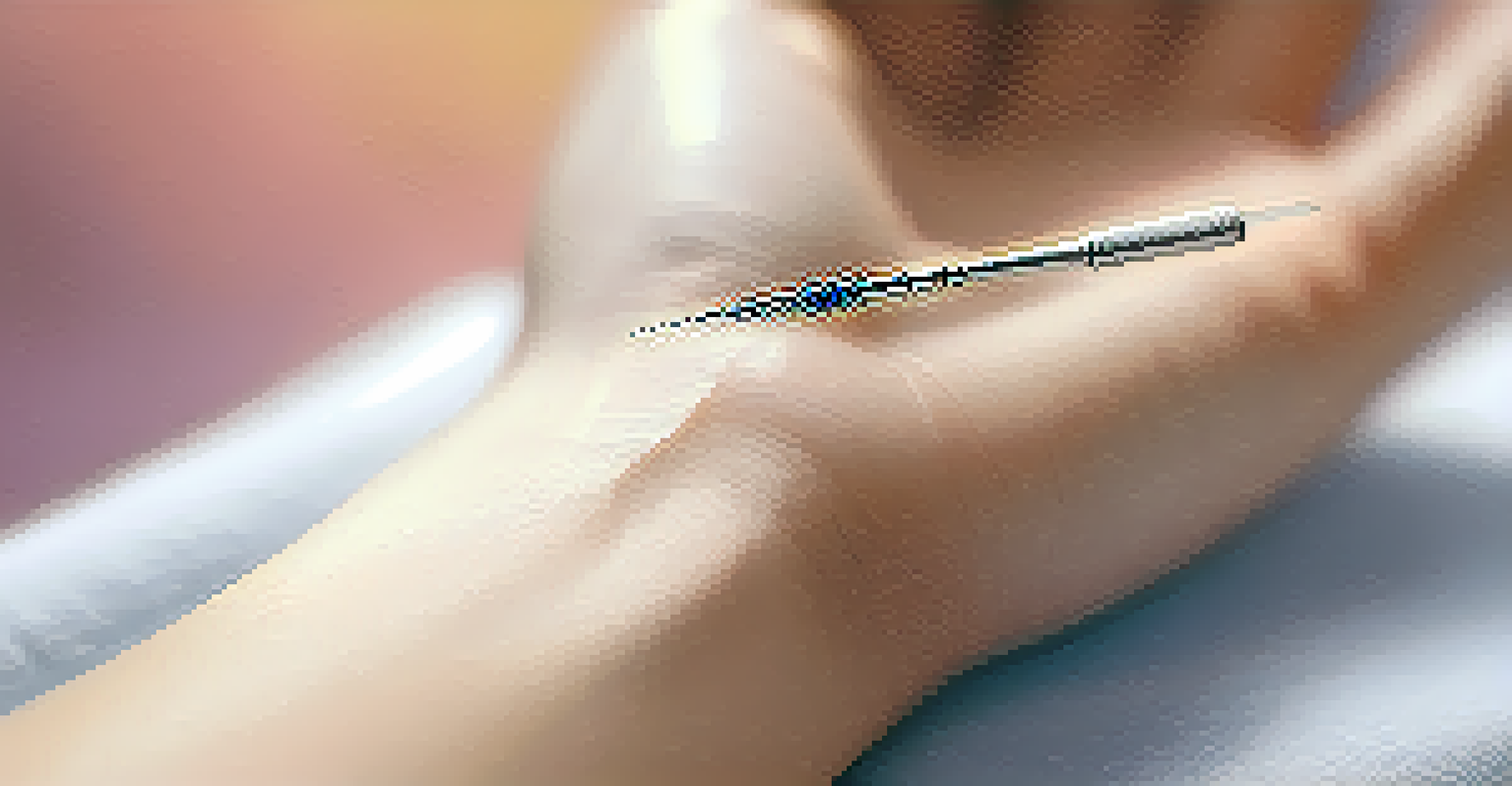The Role of Acupuncture in Mental and Physical Health

Understanding Acupuncture: A Brief Overview
Acupuncture is an ancient practice rooted in Traditional Chinese Medicine, where thin needles are inserted into specific points on the body. These points correspond to pathways known as meridians, believed to influence the flow of energy, or 'qi.' By stimulating these points, acupuncture aims to restore balance and promote healing.
Acupuncture is a holistic approach to healing that addresses both the mind and body, promoting overall well-being.
While many associate acupuncture with physical ailments, its benefits extend far beyond just pain relief. It’s increasingly recognized for its role in enhancing mental health, reducing anxiety, and improving overall well-being. This holistic approach treats both the mind and body as interconnected, making it a versatile option in health care.
In recent years, acupuncture has gained popularity in Western medicine, with more practitioners incorporating it into holistic treatment plans. This shift reflects a growing acknowledgment of the mind-body connection and the importance of treating mental and physical health together.
The Science Behind Acupuncture's Effects
Acupuncture’s efficacy can be attributed to its ability to stimulate the nervous system, leading to the release of neurotransmitters and hormones that regulate mood and pain perception. Research shows that acupuncture can increase endorphin levels, the body’s natural painkillers, which helps in alleviating both physical discomfort and emotional distress.

Additionally, studies suggest that acupuncture can decrease cortisol levels, the stress hormone, promoting relaxation and a sense of calm. This biochemical response highlights how acupuncture not only addresses physical symptoms but also targets the underlying mental health issues that may contribute to chronic stress and anxiety.
Acupuncture Enhances Mental Health
Acupuncture not only alleviates physical pain but also significantly reduces anxiety and promotes overall mental well-being.
Moreover, the practice encourages a state of mindfulness and relaxation during sessions. This meditative aspect can help individuals reconnect with their bodies, fostering a deeper understanding of their emotional states and leading to healthier coping mechanisms in daily life.
Acupuncture for Stress Relief and Anxiety Management
One of the most sought-after benefits of acupuncture is its ability to alleviate stress and anxiety. By focusing on specific acupoints, practitioners can help calm the mind and promote relaxation, making it an effective alternative or complementary treatment for those struggling with anxiety disorders.
The greatest wealth is health.
Numerous studies have demonstrated that regular acupuncture treatments can significantly reduce symptoms of anxiety, providing a natural way to manage stress without the side effects often associated with medication. For many, acupuncture becomes a sanctuary for self-care, allowing them to unwind and recharge.
Incorporating acupuncture into a wellness routine not only enhances mental clarity but also equips individuals with valuable tools for managing stress. This proactive approach encourages a balanced lifestyle, promoting resilience in the face of everyday challenges.
Physical Health Benefits of Acupuncture
While acupuncture is well-known for its mental health benefits, it also plays a crucial role in addressing various physical health issues. From chronic pain conditions like arthritis and migraines to digestive disorders and sleep disturbances, acupuncture offers a comprehensive approach to healing.
Patients often report significant improvements in their symptoms after a series of treatments, sometimes finding relief where conventional medicine has fallen short. This effectiveness can be attributed to acupuncture's ability to enhance blood flow, reduce inflammation, and promote the body’s natural healing processes.
Holistic Approach to Health
By addressing both mental and physical health issues, acupuncture fosters a comprehensive healing experience that treats the whole person.
The combination of mental and physical health improvements creates a holistic effect, allowing individuals to experience a greater sense of well-being. This interconnectedness emphasizes the importance of treating the whole person rather than just isolated symptoms.
Acupuncture as a Complementary Therapy
Acupuncture complements various traditional medical treatments, making it a valuable addition to integrated care plans. Many healthcare providers now recognize the benefits of combining acupuncture with conventional therapies, such as physical therapy or medication, to enhance overall treatment efficacy.
For example, patients undergoing treatment for chronic pain may find that acupuncture alleviates their discomfort, allowing them to engage more fully in physical rehabilitation. This synergy between therapies fosters a more holistic approach to recovery, addressing both symptoms and root causes.
Moreover, incorporating acupuncture into a treatment regimen can help reduce reliance on medications, minimizing the risk of side effects and dependency. This shift towards a more balanced approach empowers patients to take charge of their health and wellness.
Finding a Qualified Acupuncturist
Choosing the right acupuncturist is crucial to maximizing the benefits of this therapy. Start by seeking practitioners who are licensed and certified, as they have undergone rigorous training and adhere to professional standards. It’s essential to ensure that your acupuncturist has experience with the specific issues you want to address.
Many people find comfort in seeking recommendations from friends, family, or healthcare providers. Additionally, online reviews and professional associations can provide insights into an acupuncturist’s reputation and expertise. Take the time to research and consult with potential practitioners to find the best fit for your needs.
Choosing a Qualified Practitioner
Selecting a licensed and experienced acupuncturist is crucial for ensuring effective treatments tailored to your individual health needs.
Once you find a qualified acupuncturist, don’t hesitate to ask questions about their approach and treatment plans. A good practitioner will take the time to understand your health history and tailor their techniques to suit your individual needs, ensuring a personalized and effective experience.
What to Expect During an Acupuncture Session
If you're new to acupuncture, knowing what to expect can ease any apprehensions. A typical session begins with an initial consultation, where the acupuncturist will discuss your health concerns, medical history, and treatment goals. This conversation helps them create a tailored treatment plan just for you.
During the session, you will lie down comfortably while the acupuncturist gently inserts thin needles into selected acupoints. Many people report feeling minimal discomfort, often describing the sensation as a slight tingling or warmth. Once the needles are in place, you’ll typically relax for about 20 to 30 minutes, allowing your body to absorb the benefits.

After the session, you may feel a sense of relaxation or even a surge of energy. It's common for individuals to experience various emotions or sensations as their body processes the treatment. Your acupuncturist will discuss any feelings you may have and provide guidance on how to maximize the positive effects of your session.